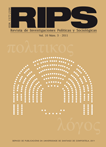El discurso político en momentos de campaña electoral. Una aproximación desde el Análisis Crítico del Discurso
Contenido principal del artículo
Resumen
El objetivo de este artículo es presentar un aporte teórico y metodológico de Análisis Crítico del Discurso aplicado al discurso político. El trabajo propone una revisión conceptual de las diferentes orientaciones, planos y propuestas de esta técnica de análisis cualitativo desde el enfoque de género. El corpus se conformó con la selección de Planes de Gobierno de los partidos políticos participantes en la campaña electoral 2017 en Ecuador en contexto con spots de campaña electoral los cuales son considerados como unidades de contexto útiles para la interpretación y análisis de los textos. Esta investigación toma como pilar la teoría foucaultiana del poder y el discurso, la propuesta es entender al discurso como un instrumento de poder. Como conclusión, los hallazgos revelan los límites de la democracia de tipo liberal y el uso de una serie de recursos discursivos que legitiman los prejuicios y los estereotipos. A partir de la identificación de una serie de cualificaciones y otros recursos como la institucionalidad, la religión o las tradiciones, se observa la manera en la que estas cuestiones son vistas como principios que determinan la veracidad y las exigencias para entrar en el orden mismo del discurso.
Palabras clave:
Citado por
10.35319/puntocero.202346176






